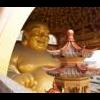Search the Community
Showing results for tags '70 year lease'.
-
Two different animals here - in Singapore, you are supposed to be "upgraded" when the old "lease" expires to new affordable housing at a new, but "affordable" price. When the "lease" is up, everyone moves out, and the housing is either refurbished, or torn down and rebuilt - to be sold to someone else. The home is bought back at market value, which will be pretty close to $0. While the "lease" is in effect, it's yours to do with as you wish, including sell it, or will it to your heirs. This has the effect of controlling the out of control housing cost spirals, but has the unnerving effect of letting your investment depreciate to $0 over the course of the 99 years. In China, on the other hand, you OWN your property indefinitely. If the government wants to take "their land" back, they will need to replace the home with a new equivalent home at 1.3 times the floor space. Nobody actually holds a lease - the developers who bought it in the first place have LONG since disappeared. The lease is "automatically renewed". That is, the "lease" applies to the land only. SINGAPORE’S HOMEOWNERS HAVE 99 PROBLEMS (AND THE LEASE IS NO 1) As the oldest public housing flats near the halfway mark of their 99-year leases, owners grapple with the fear that what once seemed an astute investment now seems doomed to depreciation A model of a public housing estate at the Housing Development Board (HDB) gallery in Singapore. Photo: Reuters
-
Here is an interesting article about home ownership in China. One can own a house but normally only can lease (for 20-70 years) the land that the house stands on: http://www.msn.com/en-us/news/world/what-good-is-owning-a-home-if-china-owns-the-land/ar-BBtIHoB I had heard about this; "Like every other homeowner in China, Mr. Chen and his neighbor own their homes but not the land underneath them. All land in China is owned by the government, which parcels it out to developers and homeowners through 20- to 70-year leases." I didn't realize this; "When the neighbor — whose surname is Wang — tried to sell her apartment, local officials told her that her lease on the land had expired. To sell her apartment, they told her, she would have to pay them one-third of the sales value." Helps explains in part about China's policy for leasing land power; "Giving land to the people would not be easy. Local governments in China do not have the power to levy taxes, so leasing land is one of the few ways they have to raise money." Nice to know; "In 2007, China moved to reassure homeowners by requiring local governments to renew 70-year leases automatically. Yet the law was silent on whether homeowners would have to pay for the renewal and what would happen to those with shorter leases." Always wonder how this can be; Ms. Wang and her family bought her 860-square-foot apartment three years ago for 1.4 million renminbi, or about $210,000 at today’s exchange rates. How do the Chinese buy and are able to afford buy a house for 210,000 USD when the typical yearly income is normally less than 10,000 USD a year? ( I am guessing at the yearly income but I think I am in the ball park, anyone agree?) 210,000 divide by 10,000 dollars would represent 21 years of total savings one's year income. Am I missing part of the picture? I thought this is an interesting subject, Housing ownership in China. Danb
- 11 replies
-
- 70 year lease
- Taxing power
-
(and 3 more)
Tagged with:
-
I pulled this from the thread on Jiaying's building into a separate topic for reference Even in an urban zone, a 70 year lease is on the land, NOT on the building, and is automatically renewed. They can't take your property (either the land in a rural area or the building) without compensating you for it - at least by law. The property laws in China are patterned after those in the West, except that "property" in urban areas is defined as including the building, NOT the land underneath. It seems to me that the 70 year leases on the underlying land are a separate issue entirely from individual home ownership, and the home ownership is not affected by the lease. "Homes"/condominiums/flats/apartments are purchased, owned, inherited, and sold much the same as homes in other countries. This is my own interpretation, as the Property Law does not seem to address this directly. China's New Property Law (March 16, 2007) - China's New Property Law, Part I -- Introduction China's New Property Law, Part II -- General Principles China's New Property Law, Part III -- Rules Of Real Property Ownership China's New Property Law, Part IV -- Real Property Use Rights China's property law is known as the Wuquan Fa. What I know of it comes from this article, which, of course, is someone's English-language interpretation of the actual (Chinese) law From the introduction in the China Law Blog article:
-
An interesting interview (well, if you ARE interested) in Caixin with the mayor of Chongqing, concerning hukous and transfer of ownership of land (that is, selling usage rights, what is usually referred to as a "70-year lease" - Caixin is a Beijing-based media company). Chongqing Mayor Says Rural Land Reform Pilot Has Been Just the Ticket


